Philippe Tondre(Oboe)
Saito Kinen Orchestra (SKO) is well known as a home of superb oboe players. One of them is Mr. Philippe Tondre who has been the member for 10 years. It is said that oboe is the most difficult woodwind instrument, but in fact, Mr. Tondre has been playing oboe since he was just 5 years old.
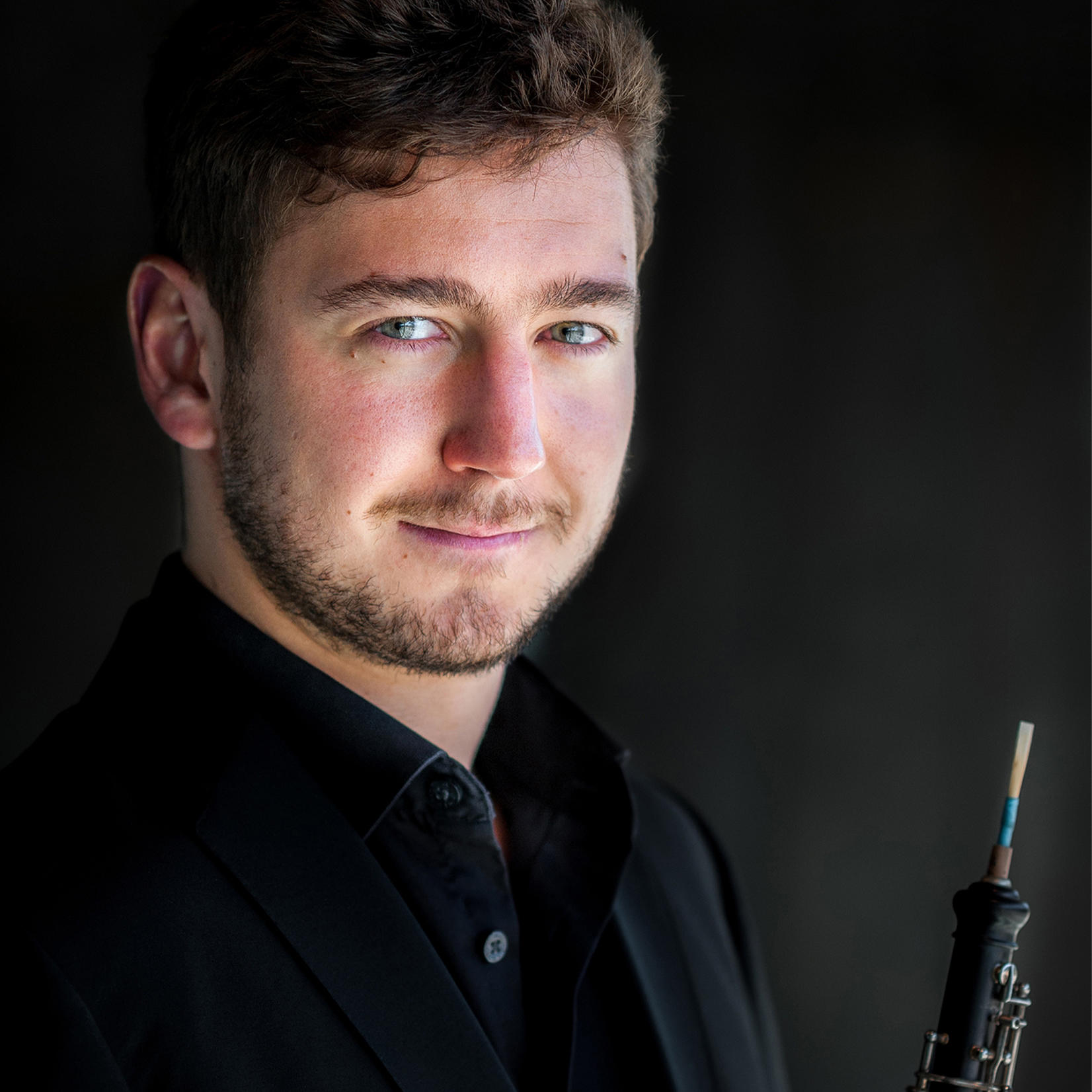
I liked the flute very much when I was 5.
―Please tell us what brought you playing oboe. You were appointed as a principal oboist of the South West Radio Symphony Orchestra Stuttgart when you were 18 years young.
I started playing oboe when I was 5. France has quite a good system when it comes to music, you can get involved in music school quite early. My parents decided to put me in a music school near our house in Les Rousses when I was a kid. I tried playing the flute first. I used to like the flute very much when I was 5, but it didn't work out well so I changed to the oboe. Voilà! That's how I started oboe and then I had continued studying at the school for about 10 years, until I became 15 with the same professor. Then I went to Paris to continue my study. From that, things went faster than I expected.
I took the audition for the South West Radio Symphony Orchestra Stuttgart audition for the first time. It worked then I got a position, probably because I was not pressured. That's how it started.
―You also competed at International Oboe Competition of Japan in 2009, hosted by Sony Music Foundation.
That competition was very important for my life because that was where I think Ozawa-san got to know me and heard my playing for the first time. There was somebody who listened to my final performance at the competition, and this person probably talked about it to Ozawa-san. Then Ozawa-san asked Sony Foundation to send the recordings, that's how he listened to me, I think.
He invited me to the SKO and the Mito Chamber Orchestra, since then I've come to Japan quite often. It all started from there. Winning at this competition was a key point in the international development of my musical path, and I am very happy.
―Oboe is known as a very difficult instrument in Woodwinds. It is surprising to hear that you started playing it when you were just a little child.
Yes, the oboe is Muzukashii (difficult)...but it's difficult because there are a lot of air techniques to get. This air technique is combined with also the mouth setups, a muscle of embouchure. This is something you cannot really practice. If you have good embouchure, it helps a lot. You can train of course, but there is morphology as well. You could have a better position to play oboe if you have a certain embouchure, that's for sure. You start younger is better because your body and your muscle shapes get used to the instrument easily. This is why I'm quite positive to start young even though it isn't easy. Kids start oboe very young age doesn't sound so charming like piano, flute, or violin. Oboe is very very specific. You have to wait many years until you have good sound. We have smaller oboe for kids with lighter keys so kids' hands can fit. You can build up children to get used to the instruments step by step.
Because of this, it makes you want to give that much energy and love for music, and for him.
―You joined the SKO for the first time in summer 2010 (*1). Please tell us how you felt when you received an offer.
I remember when I got an offer from the SKO. There was a very famous French oboe player who used to play at the SKO, Michel Giboureau. Also, Lothar Koch was playing and many other great oboe players too. Miyamoto-san (Fumiaki Miyamoto) is a very very famous oboist who had been playing in the SKO as well. So I was super excited. I could not believe I got this invitation.
―You played oboe at Orchestra Concert with conductor Tatsuya Shimono. (Toru Takemitsu: November Steps and Berlioz: Symphonie fantastique Op.14) How did you feel after the first rehearsal?
Because Ozawa-san was not in good shape at the time, he could not conduct. Shimono-san conducted Berlioz: Symphonie Fantastique and Takemitsu: November Steps.
The first time I heard the SKO sound, it was fantastic. So much surprises. It was the energy and the commitment. Everybody was putting so much. The whole inspiration and everything were for Maestro. You could see everybody was aiming to make this festival as great as possible.
Maestro is such a figure and so respected, and we wanted to do our best for him. I could feel this at the very beginning of the rehearsal. I was impressed, and because of this, it makes you want to give that much energy and love for music, and for him. It is quite a special orchestra with special sound and special energy. SKO is a big family, and this makes the SKO something special compare to other orchestras, I think.
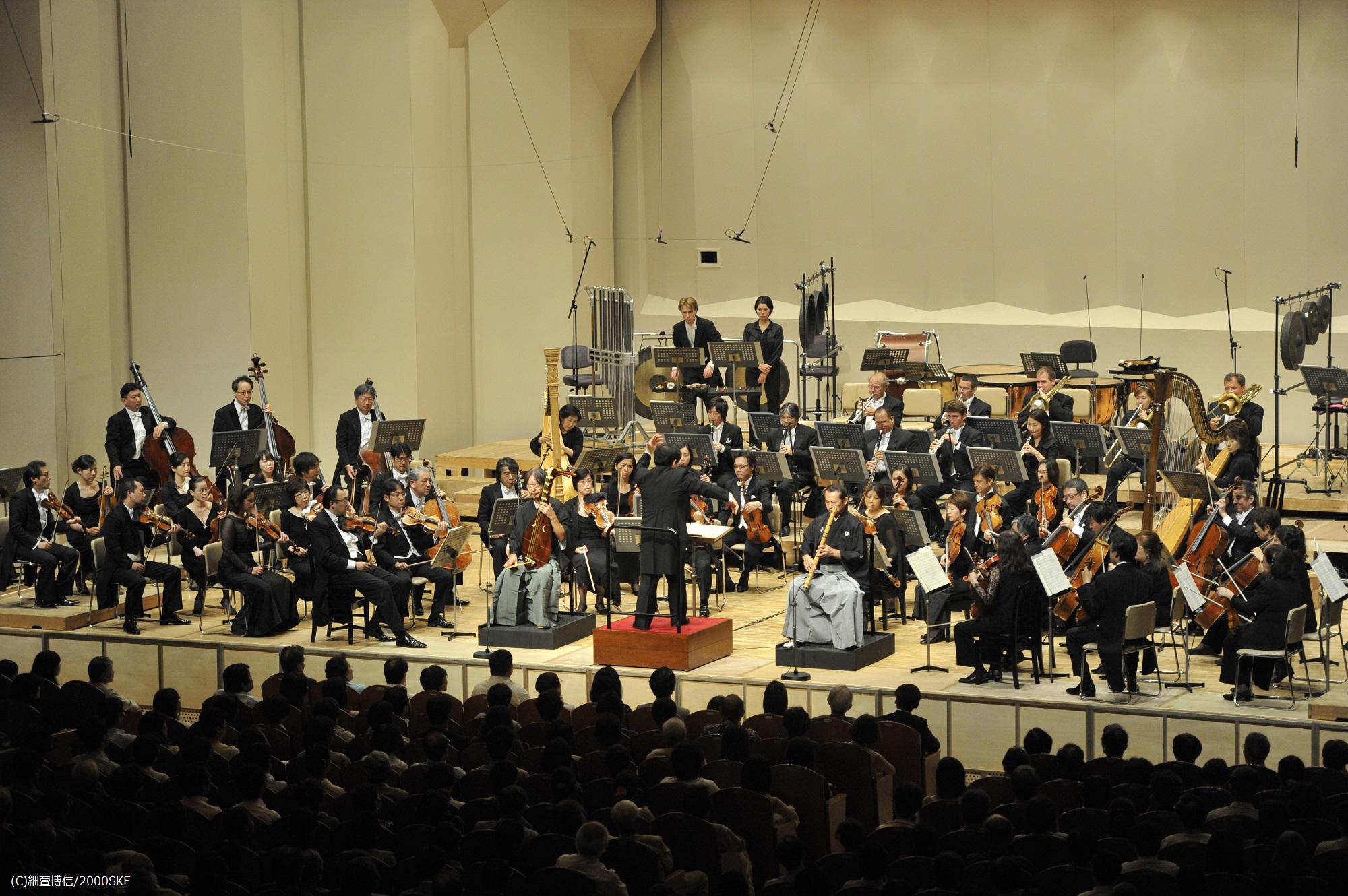
2010SKF Orchestra Concert. Toru Takemitsu: November Steps
―Is there any remarkable moment you remember during the rehearsals, or first impression for the city of Matsumoto, which you can share with us?
Well, it was a very long flight from Germany to Narita, Japan. I didn't have many experiences with long flights back then, so I was very tired when I landed. Then we had to take a bus from Narita to Matsumoto, and the driver said "it'd take about 6 to 7 hours, and maybe there is traffic". I was like "oh my god!" But he said to me it's worth it because Matsumoto is fantastic, and he was right. The first thing I did in Matsumoto was going to Yakiniku (Japanese style of BBQ) restaurant, I remember. It was so good, I was happy and very well. Because I had a jet lag and could not sleep well on the first night, I walked to Matsumoto castle. I looked at the castle in the night sky and it was so beautiful. I was impressed by the city and the food immediately. I was really, really, really, happy.
The next day was the first rehearsal. I was amazingly impressed by the very first note from the orchestra. I was not stressed, but you got kicked by the sound. It was like "OK, this is the level here, so you have to give really best of you. You have to be very accurate." It is fantastic, it is the highest quality of the festival you can imagine, and it has to stay like this. The festival takes place in Matsumoto, and I think it's an exact right place to make such festival. Ozawa-san chose it very intelligently and carefully. It's a real music city.
I have a very famous story in Matsumoto, which is a bike accident I had during the festival. That was the scariest thing. I and other SKO members were coming back from Mie-Sushi (SKO members' favorite Sushi restaurant). I still don't know what exactly happened, but I was pedaling and at some point, the chain broke and I fell on the ground hitting my lips so hard. It was a disaster. There was a cut but luckily only inside of my lips were cut. I think the doctor was one of the Ozawa-san's doctors, and she could do a magnificent job on my lips. For some reasons, she could help me with the wound so the cut was cured and I could play again. It was 2013 while Ravel's Opera "L'enfant et les sortilèges".
We miss a lot of Matsumoto this year since it's a part of our musical life every year. Matsumoto is like a second home to me. The restaurants, friends, our hiking spot in the mountains, fitness center... seriously, we are missing all of the staff.
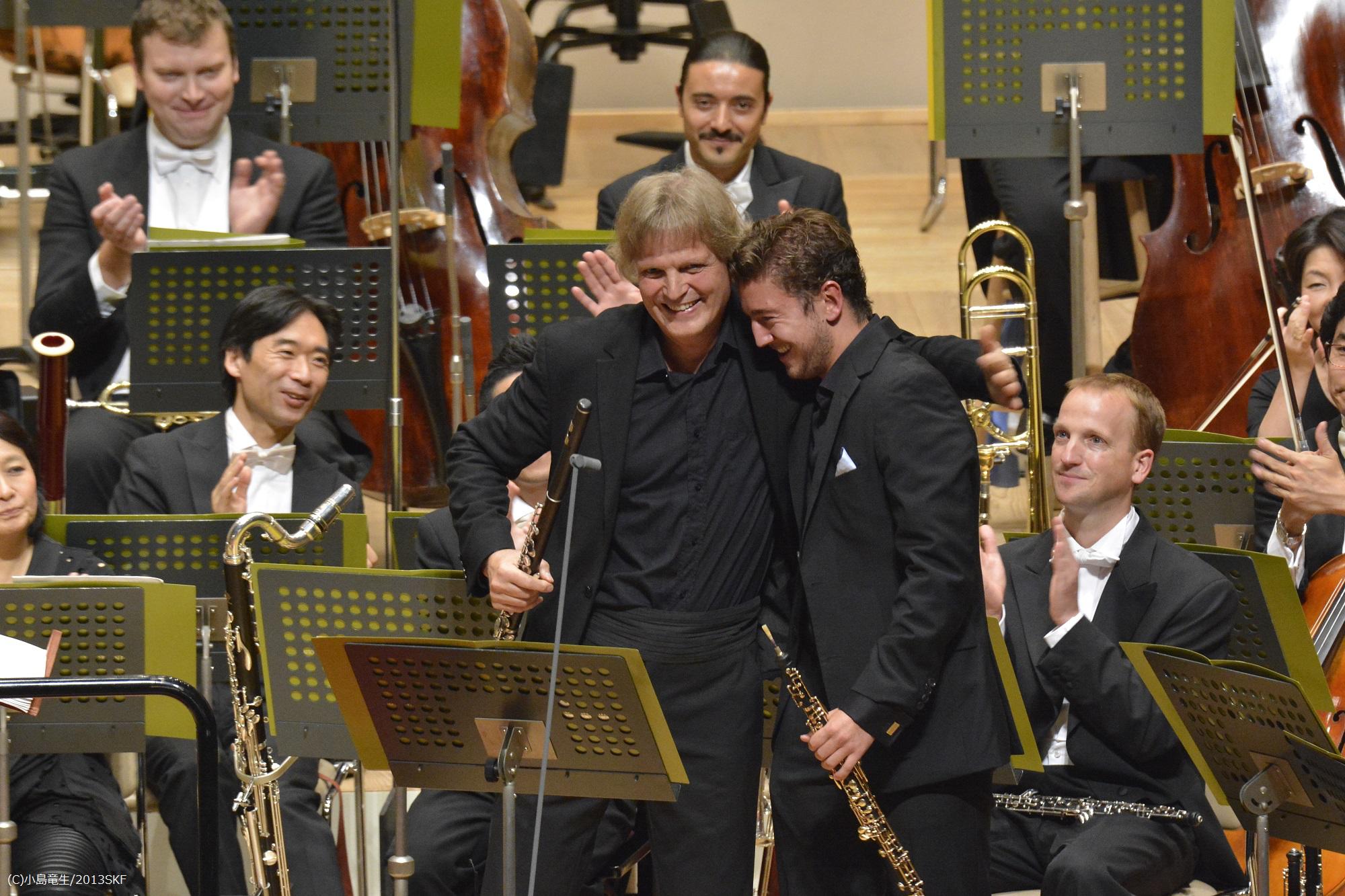
2013SKF Orchestra Concert. Mr. Tondre played Ligeti: Double Concerto for Flute, Oboe and Orchestra(Japan Premire) with Jacques Zoon (flute).
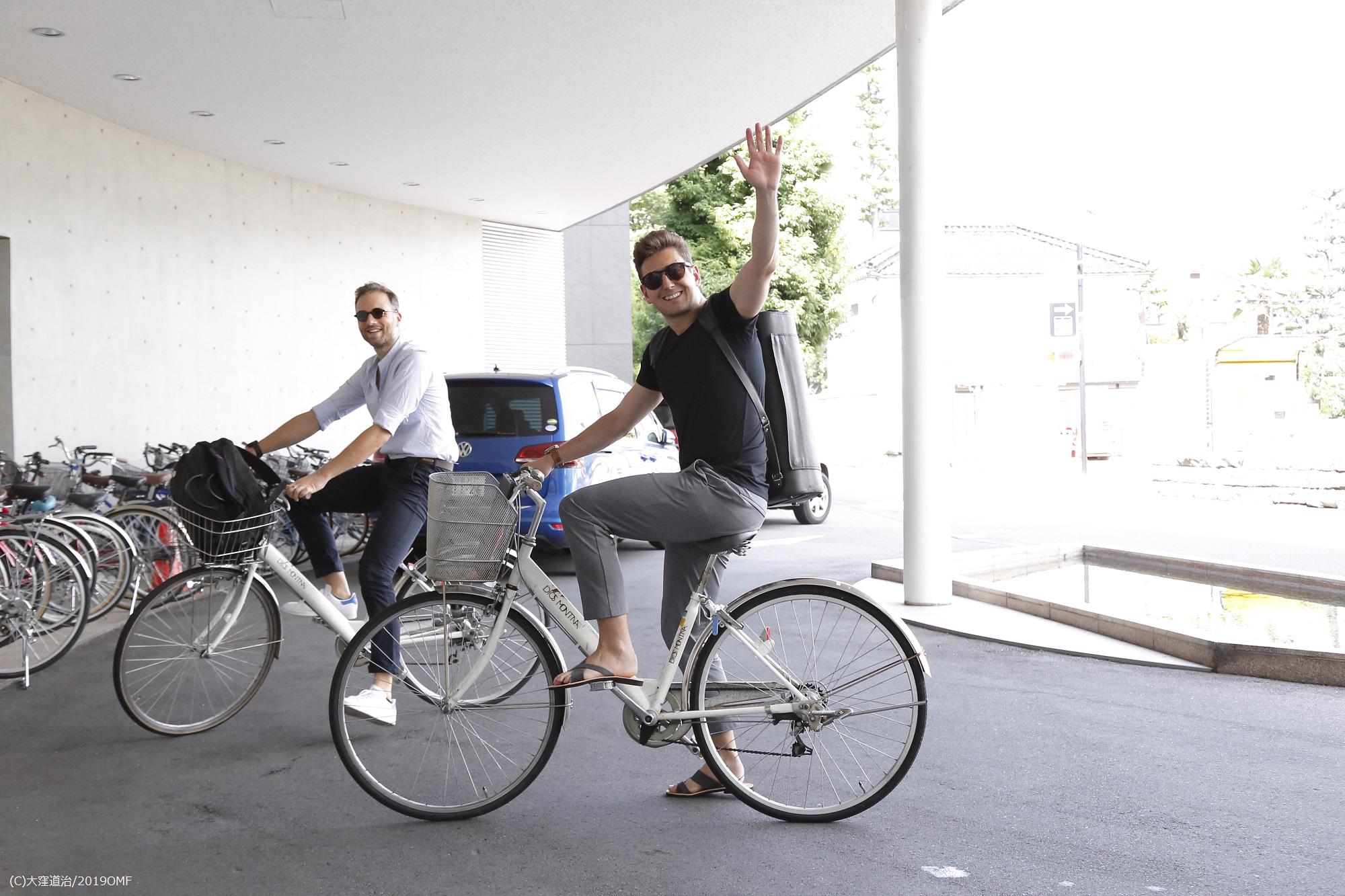
There are several venues in Matsumoto city for the festival programs, and Mr. Tondre comes to almost all of those by bicycle.
―You performed under Mo. Ozawa's baton for the first time in December 2010 at NYC Carnegie Hall.
We rehearsed in Boston. I remember being quite excited because it was the first time for me to go to the US. And I met Ozawa-san for the first time. It was amazing for me to play with him for the first experience, it became a very special moment for me.
He is one of the most powerful conductors emotionally with the most efficient conducting technique. Technically he does not show much, but with his technical ability, you can see everything he wants. It is so simple but at the same time, covers everything he needs. It's incredible. This is what always impresses me. He is able to show things without saying it in the simplest way.
The second thing I'm impressed with is his tempo. His way of communicating his tempo is...how can I say..., the movements of the pieces are incredible. He is the only one who has such a great focus on rhythm and is able to proceed with keeping the music alive with great stability. I have no ideas who can do better than him. Really, he is one of the best in the world.
And foremost, he is very humble. There were some moments we were not playing together, and obviously, it was our fault because we were not listening. But he always says "Ah sorry, I tried something else, so maybe my fault." His humanity to the musicians is the biggest quality, I believe. Because he respects us, we respect him a lot. This way of communication is the healthiest, and this is to bring the orchestra to the next level. You could see in the rehearsals so many things are growing. It's when you play with someone so special, of course you play better. Because you know you have to give your best, so you are giving much more than usual. It could be something about spirit. He has so much charisma. You can feel he puts really into the music, and it's good for us. Young musicians also get to see this, to see someone else so true to the music. He knows it is so important for the young generation, that's why he created Seiji Ozawa Music Academy, Ozawa International Chamber Music Academy Okushiga, and Seiji Ozawa International Academy Switzerland. He wants young generations to continue his way of playing, his way of feeling to the music and this is why I immediately felt that I was part of it. I knew he was respecting me and also trying to get the best out of me, this is why I respect him. It was a very eye to eye experience.
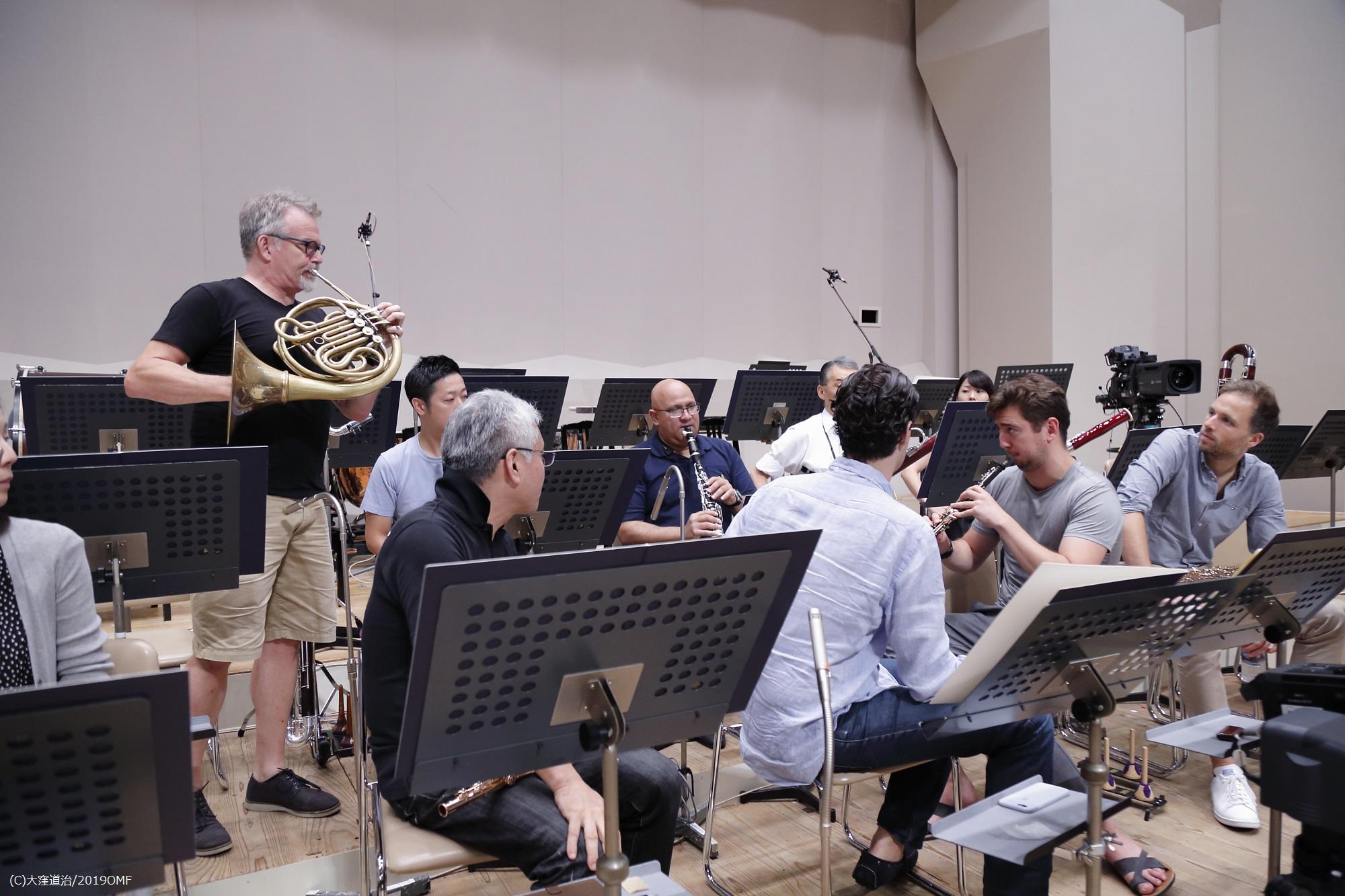
2019OMF Rehearsal of Orchestra Concert.
The best way to keep the motivation is to diversify your activities.
―I'd like to ask about the chamber concert program from OMF 2019. How did you come up with the idea?
It is so fantastic that Max Werner and Matthieu Petitjean are also members of the SKO. We thought it would be nice to present trio pieces for oboe because it's not known much. At the last chamber concert we did at Matsumoto, we played a lot of different big ensembles for Winds, quite big music for chamber music ensembles. This time we wanted to propose something smaller, something more authentic in a way for just one type of instrument. That is how we came up with Beethoven.
We were happy to be able to perform for chamber concert, especially because I love the Harmony Hall in Matsumoto. It's fantastic to play chamber music there. It's important for us musicians to play chamber music with our colleagues in festivals because we can get to know each other musically. You have to make music, you have to get used to that person, you have to be together, and the chamber music helps for all of these. It's a great idea from Ozawa-san to give us the opportunity to play. That's why I think it's very good if all orchestra members play chamber music if we get opportunities. We have to continue even we are close to each other, we get this important to listen to each other, to learn from each other, to discover how to play better together.
I think it was a nice concert, and we were really happy.
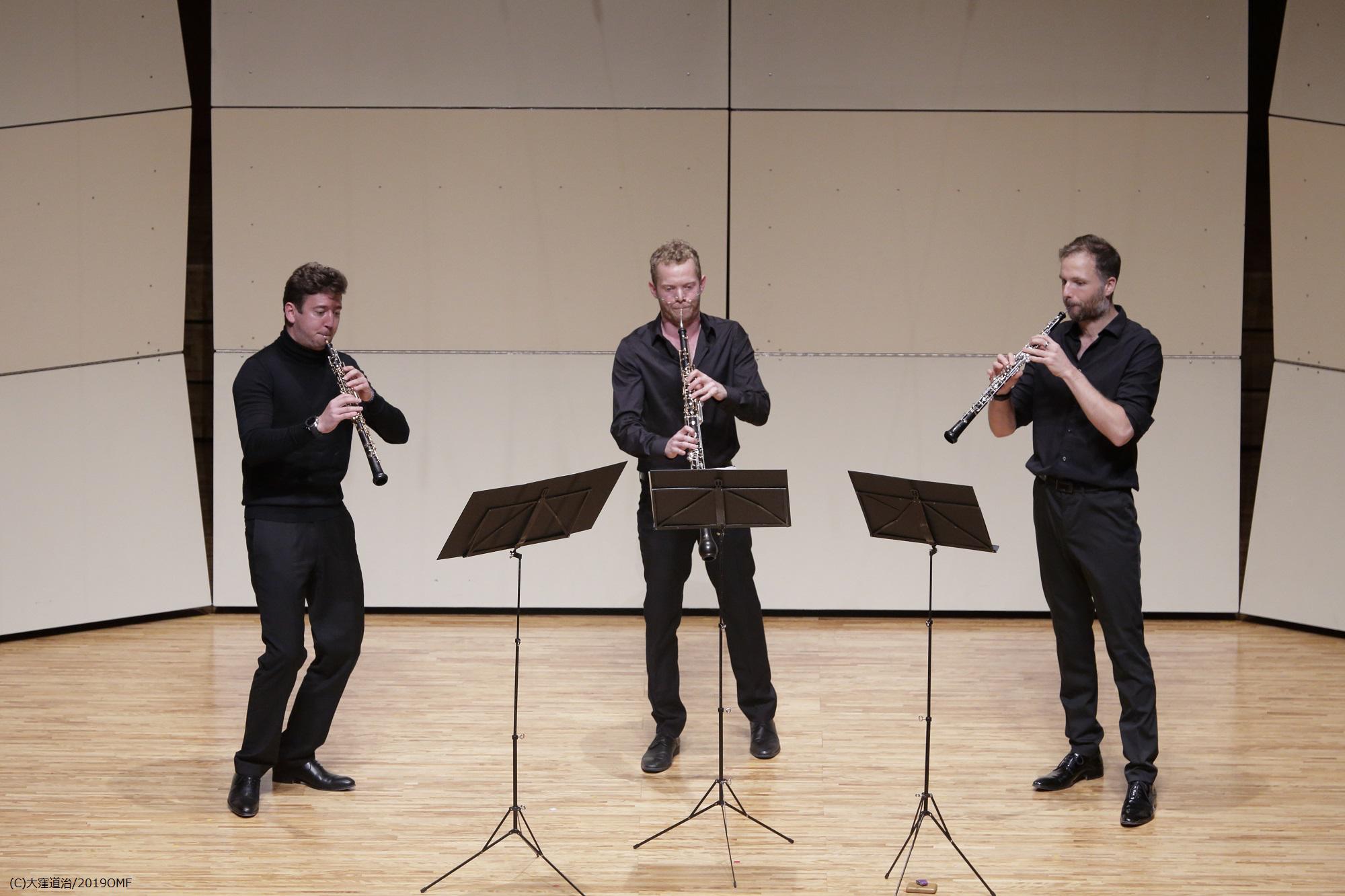
2019OMF Chamber Concert II. From left)Philippe Tondre, Max Werner and Matthieu Petitjean.
―Along with orchestra performances, you also perform chamber concerts of the festival. You are also willing to teach young musicians as well. Where does your passion come from?
As an oboe player, I suppose the best way to keep the motivation is to diversify your activities. Oboe is able to do many things; playing in the orchestra, chamber orchestra, solo concerts, recitals, and teaching. If you could form all of this in your circle of activities, you have much more potentials because you constantly think differently on different levels. This is how I keep my motivations.
I need to teach because this is very important for me to learn from my students. I learn about myself when I teach, this is fantastic. You could be your own professors, which is great. Playing in chamber music is also very important because you have opportunities to listen carefully and working details on different repertoires. For oboe, this is important because you are constantly playing chamber music in the orchestra, you have to concentrate on your group, and also you have to lead your woodwinds section.
Of course, playing in the orchestra is the same because the oboe is an orchestra instrument. I think all oboe players have to play in the orchestra at some point because you have so many repertoires there; operas and symphonies. You have to learn all of those styles and pieces, it's important. Because the oboe is a soloistic instrument in the orchestra, you need to focus on concert repertoire as well. Recitals and concertos with orchestra are also important to do because it develops your creativity, your imagination, and also your ability to push the technical ability further on the instrument. This helps orchestra too. So all those activities are connected, and this is very important for an oboe player. You have to be very happy to do everything. I think if I were only doing orchestra, I would be a little bit frustrated, I would not be fulfilled with. I need to teach, I need chamber music, I need everything around it so I could feel that work is complete. That gives you the motivation because it's always different, and it's never the same every day. I would say this is how my passion comes from.
―Thank you.
*1: In 2010, SKO performed twice; in summer in Matsumoto (for Saito Kinen Festival Matsumoto) and in winter in New York. The concert at Carnegie Hall was the opening concert of JapanNYC special program.
Interview: July, 2020
Listener: Ayumi Seki (OMF PR staff)